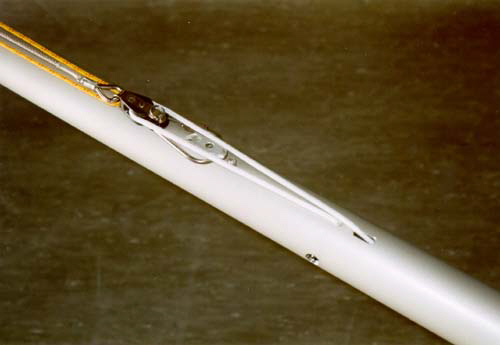|
SPICE |
 |
the new high performance concept by bautek |
||
We
decided to develop an all around glider that satisfied the needs of most good pilots, not
just the ones in the competition scene... It was clear to us from the start, that it
would be a very difficult task and it would involve a lot of time and work. Even
after the initial design and test flight phase, we made many small changes to the sail and
airframe during the last 6 months of development. We were obsessed to achieve our
development goals to perfection. It took a while, but
|
||
|
||
What's new on the Spice?With the exception of a few structural parts from the Twister, the Spice is a completely new design. Through the use of leading edge tube with a 50mm diameter we’ve created a sharper airfoil with less drag. The wing taper, sail cut, nose angle and V-form are entirely new. The deeper double surface allows the use of longer inner swivel-tips (sprogs) which offer more support further back, thereby limiting the twist in the sail. A coil spring device keeps the lower side wires tight when the VG is loose. From these newly developed aspects we’ve created a “menu” with the name Spice – “red hot seasoning” which is easy to “digest”. |
||
The SailThe leading edge and trailing edge parts of the upper surface are made of Laminat PX 10. Since the middle part of the upper surface is prone to wear through repeated set-up and breakdown, it is made from proven, crease-free 4.0 oz Dacron sail cloth. The wing tips have been fitted with newly designed, slightly larger plastic end caps which insure an optimum outflow of wing tip vortices. The sail area has grown slightly to 14.2 m2 (153 ft2). The outer forward edges of the lower surface are still equipped with our patented “Speed Valves”, which allow for pressure equalization between the left and right halves of the sail, resulting in exceptional directional stability. The tapered keel pocket covers the anchor for the crossbar tensioning cable, thereby reducing drag. And short zippers in the leading edge on both sides of the nose prevent creasing when the glider is packed. |
||
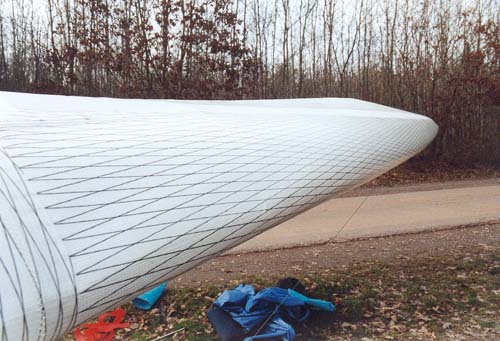 |
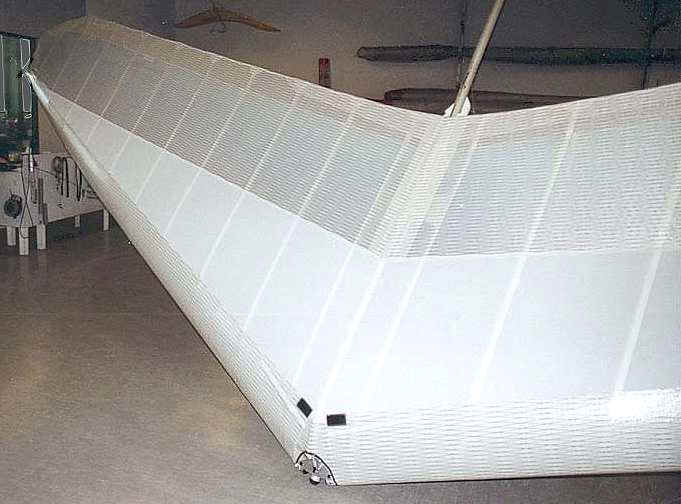 |
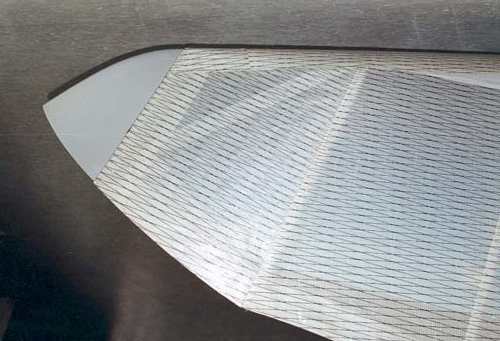 |
|
||
|
||
|
||
The AirframeThe Spice also uses the proven crossbeam design from the Twister which, in comparison to beams made from carbon fiber, doesn’t require a factory inspection until 5 years after manufacture. This aluminum tubing and steel cable construction can easily be checked for damage by the pilot himself. The rear lower flying wires are forked and fastened to the keel at a relatively steep angle, allowing the pilot more freedom of movement when steering and reducing the risk of damage during a crash. These forked flying wires in combination with the seesaw hang loop mounting, produce pleasantly light handling. The tapered the keel not only looks good, but is aerodynamically advantageous. The sliding transom is made from rectangular aluminum and both ends are fitted with newly designed mylar feet which slide very easily when using the VG. The pulleys for the tensioning cable and VG are of the ball bearing type. The Spice is equipped with a round base tube to allow the installation of safety wheels. An optional flaired aluminum base tube with carbon fiber skids as wheel substitutes is available. |
||
|
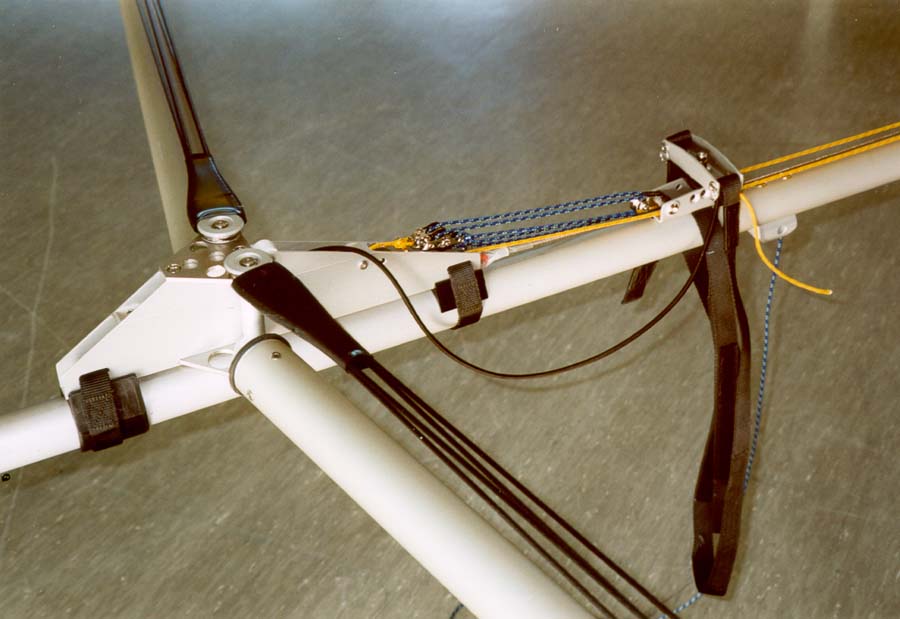 |
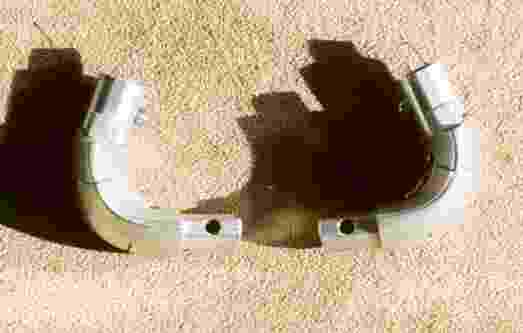 |
|
||
|
||
How does the Spice fly?Integrated steel springs hold the lower side wires taut when the Spice is on the ground, allowing it to be easily set horizontal in the pitch axis before take-off. The glider’s completely neutral center of mass makes it seem lighter than it is and makes it unnecessary to compensate for tail heaviness during the take-off run – the Spice begins flying after only a few steps. At trim speed the base tube is about at the level of the pilot’s forehead. This assures a harness angle with low drag when flying around 60 kmh (37 mph). In weak thermals almost all gliders (especially those with fiberglass tips), must be high sided. Not the Spice! With the VG loose, it is totally neutral when turning, and has only a slight tendency to dive when the VG is fully tightened. This allows the Spice to take on weak thermals directly and convert them into altitude. When the VG is tightened, the base tube wanders slightly to the rear and the trim speed increases. In this state the Spice’s increased performance potential is most noticeable. The flat, hard state of the sail makes fast, tireless gliding possible. At the same time it remains steerable, enabling the pilot to feel secure when flying in a gaggle or close to steep cliffs. The high stability of their mountings allow the sprogs and defined tips to be set very low at the tightest VG setting, considerably reducing bar pressure when flying at high speed. Essentially it allows the pilot to vary the pitch by changing the VG position to conform to his individual definition of safety limits. Why didn’t we integrate the Safety-Pitch-System into the Spice? The automatic raising of the defined tips with its associated braking effect in the Twister’s Safety-Pitch-System, limited top speed to less than 100 kmh (62 mph). Since there are many pilots who expect more high end potential, and since the DHV has raised the maximum permissable speed to 90 kmh (56 mph), we’ve decided against it. The Spice’s maximum speed now lies distinctly above 100 kmh, it has been classified – as usual under these circumstances - as a Class 3 glider. In all other evaluation criteria the Spice meets the prerequisites for a Class 2 glider! It glides very long in ground effect and has a gentle stall when flaring. For pilots who prefer a shorter, harder stall we recommend landing with the VG slightly tensioned. At the last moment the Spice’s nose rises automatically and the glider flares cleanly – perfect landings are kid's stuff with the Spice! |
When can the Spice be delivered?Normaly it takes about six weeks. As a rule, custom colors can be ordered at no extra cost. |
. |
|||
Technical Data |
|||
| Glider model | Spice | ||
| Special features | Topless | ||
| Certification number | DHV 01-0396-03 | ||
| Glider class | DHV 3 | ||
| Number of seats | 1 | ||
| Certified for UL and winch towing? | Yes | ||
| Sail area | 14.2 m2 (153 ft2) | ||
| Span | 10.6 m (34.8 ft) | ||
| Nose angle | 132° | ||
| Aspect ratio | 7,9 | ||
| Double surface | Approx. 90% | ||
| Glider length packed | Long 5.7 m (18.7 ft), short 4.1 m (13.5 ft) | ||
| Number of battens | 29 (8 in lower surface) | ||
| Stall speed | Approx. 25 kmh (15.5 mph) | ||
| DHV maximum permissable speed | 90 kmh (56 mph) | ||
| Minimum sink speed | Approx. 35 kmh (22 mph) | ||
| Maximum L/D speed | 52 kmh (32 mph) | ||
| Permissable take-off weight | Min: 100 kg (220 lb) | Max: 132 kg (290 lb) | |
| Permissable load | Min: 64 kg (141 lb) | Max: 95 kg (209 lb) | |
| Glider weight without cover | Approx. 36 kg (79 lb) | ||


